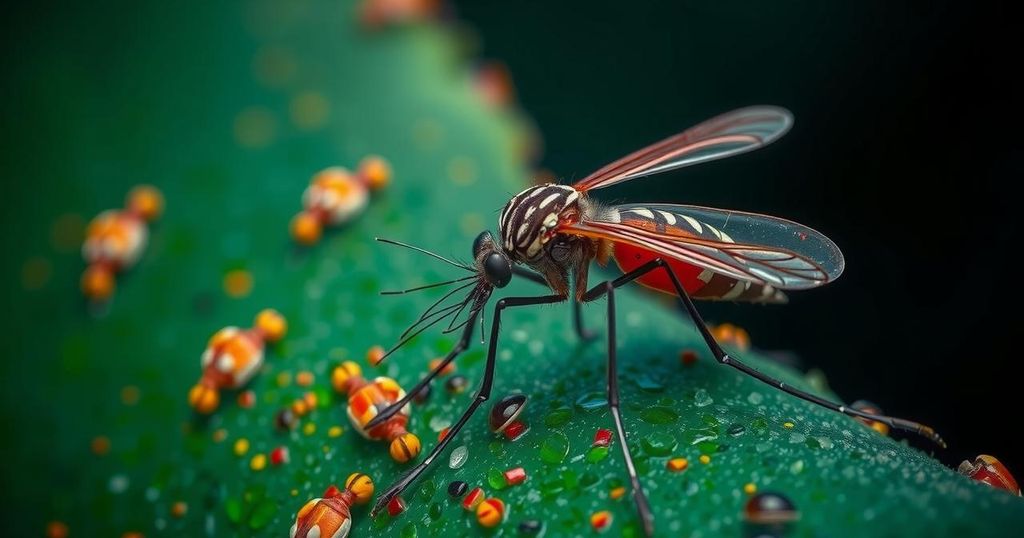The United Nations has warned of a rising malaria threat in South Sudan due to severe flooding impacting 1.4 million people. The recent introduction of the R21 malaria vaccine aims to combat this crisis, as South Sudan faces one of the highest malaria rates globally. Health strategies including the use of treated mosquito nets are crucial for preventing further disease transmission.
The United Nations has issued a grave warning regarding the rising incidence of malaria in South Sudan, exacerbated by devastating flooding that has impacted approximately 1.4 million individuals and displaced more than 379,000 people, amidst growing food insecurity. Parts of the country have experienced the worst flooding in decades, primarily affecting the northern regions. According to the UN Office for the Coordination of Humanitarian Affairs (OCHA), a total of 43 counties, including the contested Abyei region, are suffering from severe flooding, which has strained the existing health system. In a significant move towards combating malaria, South Sudan, alongside Côte d’Ivoire, became one of the first nations to roll out the new R21/Matrix-M malaria vaccine in May 2023, targeting vulnerable children at risk of malaria. The Ministry of Health received more than 645,000 vaccine doses, distributing them across 28 counties with the highest malaria loads, while plans are in place to expand the vaccination program nationwide. The World Health Organization (WHO) has reported that South Sudan has one of the highest rates of malaria incidence globally, with an alarming estimate of 7,680 cases and 18 fatalities daily. Furthermore, malaria remains the leading cause of death among children in South Sudan, with 2.8 million pediatric cases and 6,680 deaths recorded in 2022 alone. Medical professionals have expressed optimism regarding the R21 malaria vaccine’s potential to transform the current health crisis, as the government often incurs significant expenses on antimalarial drugs and testing kits. In an effort to mitigate malaria transmission, results from the Malaria Consortium indicate that 85 percent of the at-risk population utilized recommended prevention methods, such as treated mosquito nets, in 2023. Continuous advocacy for the use of treated mosquito nets as an essential preventive measure to combat malaria has also been emphasized by researchers, urging communities to prioritize these protective tools.
South Sudan is a nation facing significant challenges posed by climate change, with escalating flooding that has intensified vulnerability within its population. The aftermath of such environmental disasters leads to health crises, notably an increase in waterborne diseases and malaria incidence, which disproportionately impacts children under five. The region’s health system, already fragile, is overwhelmed by emergent health challenges. The introduction of innovative vaccines such as R21/Matrix-M represents a critical advancement in public health efforts to reduce malaria-related morbidity and mortality. Furthermore, the WHO’s recognition of South Sudan as one of the countries with the highest malaria burden underscores the urgent need for comprehensive health strategies, including vaccination programs, distribution of mosquito nets, and targeted health interventions. The backdrop of ongoing humanitarian crises, exacerbated by political instability and food insecurity, further complicates efforts to contain malaria and improve overall health outcomes.
In conclusion, the rising incidence of malaria in South Sudan amid unprecedented flooding highlights a critical public health challenge that necessitates urgent intervention. The introduction of the R21 malaria vaccine presents a hopeful avenue to mitigate this disease’s impact, particularly on vulnerable children. Coupled with preventive measures such as the widespread use of treated mosquito nets, these initiatives are vital in transforming the health landscape of South Sudan. However, ongoing support from both national and international health organizations will be essential in ensuring the success of these programs and safeguarding the health of those at risk.
Original Source: newscentral.africa






